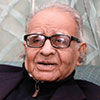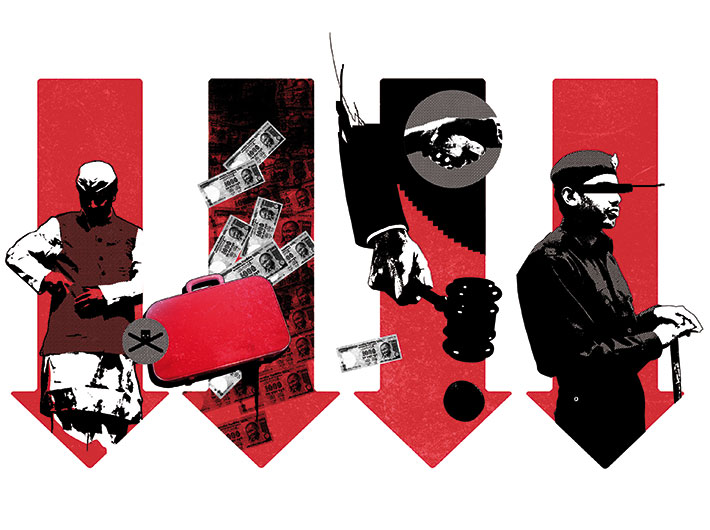Lack of accountability and auditing in successive governments has led to rise of corruption
 By TN Chaturvedi
By TN Chaturvedi
(Former comptroller and auditor general of India)
Generally, there has been a political apathy in tackling corruption in our country ever since independence. Corruption has been in our society for long – there were a few scandals even during the first government of prime minister Jawaharlal Nehru.
The Jeep scandal was the first scam in independent India but there was never a serious effort to curb it. VK Krishna Menon, who was embroiled in the controversy later, became the defence minister. Even in the late 1950s, the Mundhra scandal that broke out led to the resignation of TT Krishnamachari. The justice Chagla committee, which was constituted to inquire into it, said it was responsibility of the political masters.
These were all high-level scams and inquiries were also set up against former Punjab chief minister Partap Singh Kairon and former Odisha chief minister Biju Patnaik but the political masters avoided taking stern action against them.
The Kriplani committee to find irregularities in the Indian railways was formed in 1953 and brought out a vivid picture of corruption prevalent in the railways. It also gave a glimpse of the entire system.
 Another seminal report by the Santhanam committee appointed in 1962 found corruption not only at higher and lower echelons of administration, but also at the political level. Had these reports been implemented properly many things would have been nipped in the bud and corruption might have been contained. Though there was a follow-up of the Santhanam committee report, it was lackadaisical. The central vigilance commissioner (the earlier avatar of the current CVC) had been appointed, but nothing much happened.
Another seminal report by the Santhanam committee appointed in 1962 found corruption not only at higher and lower echelons of administration, but also at the political level. Had these reports been implemented properly many things would have been nipped in the bud and corruption might have been contained. Though there was a follow-up of the Santhanam committee report, it was lackadaisical. The central vigilance commissioner (the earlier avatar of the current CVC) had been appointed, but nothing much happened.
There were the odd incidents once in a while that raised hope – like steel and heavy industries minister C Subramaniam appearing before the public affairs committee (PAC) after the comptroller and auditor general (CAG) castigated him on blacklisting of a Kolkata-based steel trader but they remained just that: odd incidents.
A large-scale political apathy [towards corruption] continued in the Indira Gandhi government. The division of the Congress in 1967 was a turning point in a restrained approach towards the venality of public affairs; in fact, there was a no-holds-barred approach to it. There was some kind of collusion and the corrupt ministers felt bureaucrats are part of the nexus. The political parties needed money to purchase the candidates. Unlike today, however, there was hardly any nexus between politicians and businessmen then. That trend started particularly with the rise of Reliance Industries.
During Indira Gandhi’s tenure whenever a discussion took place on corruption, she used to say that it was a universal phenomenon. Large-scale development activities had started by the time Indira took over and it became easy to siphon off money. Both officers and politicians benefitted from it. There was collusion on two fronts – among the political parties and between officers and politicians.
In fact, so closely did the two get interlaced that many development economists used to call corruption a lubricant to the wheels of development. Such expressions had a long-lasting impact and were certainly a bane for a poor society like ours. There was never any accountability measures.
The 24-page report that shook India
I was appointed the CAG during Indira Gandhi’s second tenure (1980-84). I resigned as the home secretary to take this constitutional post. But I felt unhappy as there was too much interference in Punjab affairs by the baba-log [Rajiv Gandhi and Arun Nehru]. I knew that the central government’s policy is not the way I wanted and something drastic needed to be done.
When Rajiv Gandhi took over (as prime minister), the Bofors scandal rocked the nation.
 There is a director of audit in the defence ministry who does the auditing of normal purchases [by the ministry]. But since it was getting difficult to get documents on Bofors from the ministry, he complained to me. I was surprised and rang up the then defence secretary, SK Bhatnagar, and asked about the documents. He promised to hand over the document to the defence audit. But, despite all my effort, the documents were not provided.
There is a director of audit in the defence ministry who does the auditing of normal purchases [by the ministry]. But since it was getting difficult to get documents on Bofors from the ministry, he complained to me. I was surprised and rang up the then defence secretary, SK Bhatnagar, and asked about the documents. He promised to hand over the document to the defence audit. But, despite all my effort, the documents were not provided.
The defence audit again rang up and told me that they were given some papers but not the entire set of documents. When I met Bhatnagar, I told him to take corrective action. But when the papers were not supplied even after that, I approached defence minister KC Pant, who immediately told his officials to supply the papers.
When we got the papers, we found something wrong in them, as a different technical assessment was made in the purchase. We sought clarification and gave them a chance to clarify. When scrutiny was going on and we came to a tentative conclusion about some irregularities, the Swedish radio broke the news of the Bofors scam.
All hell broke loose. In India, many papers had already started writing about it but now it became a high-profile case.
I had to work on the draft several times but since I wanted to be sure about everything, it came out in public that I was changing the report. One day VP Singh rang me up after he resigned from the Rajiv Gandhi government. I told him that the report would come out with the best of my judgment. The CAG office was very fair to the government at every stage it enquired. It was a small report of 24 pages. Though some officers wanted it as a separate report, I said no, and it was part of the defence report.
But I was very firm about one thing: whatever facts emerge, I would bring them out. The problem for Rajiv Gandhi was that economics of the deal must be worked out [as Gandhi, the then PM and also defence minister, wrote in one of the deal documents]. But the same economics was never reworked and the contract was signed within a week. When people went to test the gun, it was hardly tested – they [the Bofors guns] were moving around somewhere else. It is unfortunate for the country if such things happen in defence deals. The report was checked many times over from every angle before it was made public.
Changes I brought into CAG
Earlier, company 'A' or 'B' was written in the CAG report (instead of identifying the firms concerned) but I stopped the practice. Why not name the company? The officers were afraid (but) I said this is a constitutional document prepared with extreme care, so remove the speculation in the report.
The second thing I started was the practice of bringing out excerpts of the report in easy language for the press and public to read, understand and comprehend because these reports are not always easy to read. In my time it was published in 'yellow paper' but the practice was stopped by my successor. When Vinod Rai became CAG, he again introduced it (excerpts, or ‘Noddy books’, as they are popularly called) in a much more elaborate form.
The CAG’s job is not to find corruption but how the government intends to spend the sanctioned money. Three submarines were purchased before Bofors (deal) and that also came out in the CAG report. We were not chasing anything in the Bofors case but it so happened that our officers were not getting the papers from the defence ministry (which raised suspicion).
Credibility for the CAG office was established after the Bofors report and reinforced by Vinod Rai. He also had a good eye for important cases and restored confidence of the constitutional post. People say there was a lull after me and before Rai took over [as CAG]. Some reports like ‘Coffin-gate’ (allegations of corruption in the purchase of coffins after the 1999 Kargil war) came out, [but] this was again politicised much more than what was there in the report.
After the Bofors scandal broke, we felt handicapped by the lack of government financing whenever we wanted to start something new, or wanted to send an officer abroad to learn auditing practices.
People often ask me why CAG doesn’t have power to recover money, as is the case in some other countries. I tell them there are checks and balances in the Indian system. If CAG does it, there will be court cases and one officer will always be attending these cases. The job of CAG is to alert the government and inform the public that money sanctioned through parliament is spent properly. We are not an investigating team or authority.
Corruption has increased [over the years] due to [increasing] government expenditure over populist measures without accountability. Not only accountability, there was hardly any accounting system for any populist scheme. An internal audit, if it functions properly, will help each ministry function better. But the internal auditor should report to the secretary – he/she may be a small person in the ministry but you must give him/her the authority.
In the 1980s, JRD Tata made a suggestion that industrialists should form a club to channelise money given to the political parties for fighting elections. Every record should be made available in public so that people know. But it was a non-starter. That was a lost effort.
The present set of bureaucracy is much more informed and knowledgeable; and have much better education. However, one disturbing aspect is their attempts to manage postings in their favour. During our time, we never bothered about the job given – good or bad. Seeking favours have now become more apparent but there are many honest and hardworking officers.
Another thing I ensured during my tenure was to take the citizen's viewpoint into my job.
Many would not have thought that corruption would grow exponentially after liberalisation in the early 1990s. But I would say the same class of people who benefitted and exploited the system in the regimented and planned economy are exploiting and benefitting from it even today.
Any anti-corruption movement can only alert the government; the system then has to be institutionalised. Now every eye is on the Lokpal. People who will man the institutions will have to work very hard to make them good institutions.
(As told to Trithesh Nandan)
This column appeared in the February 1-15 anniversary issue of the print magazine – CHANGE: India on the move

